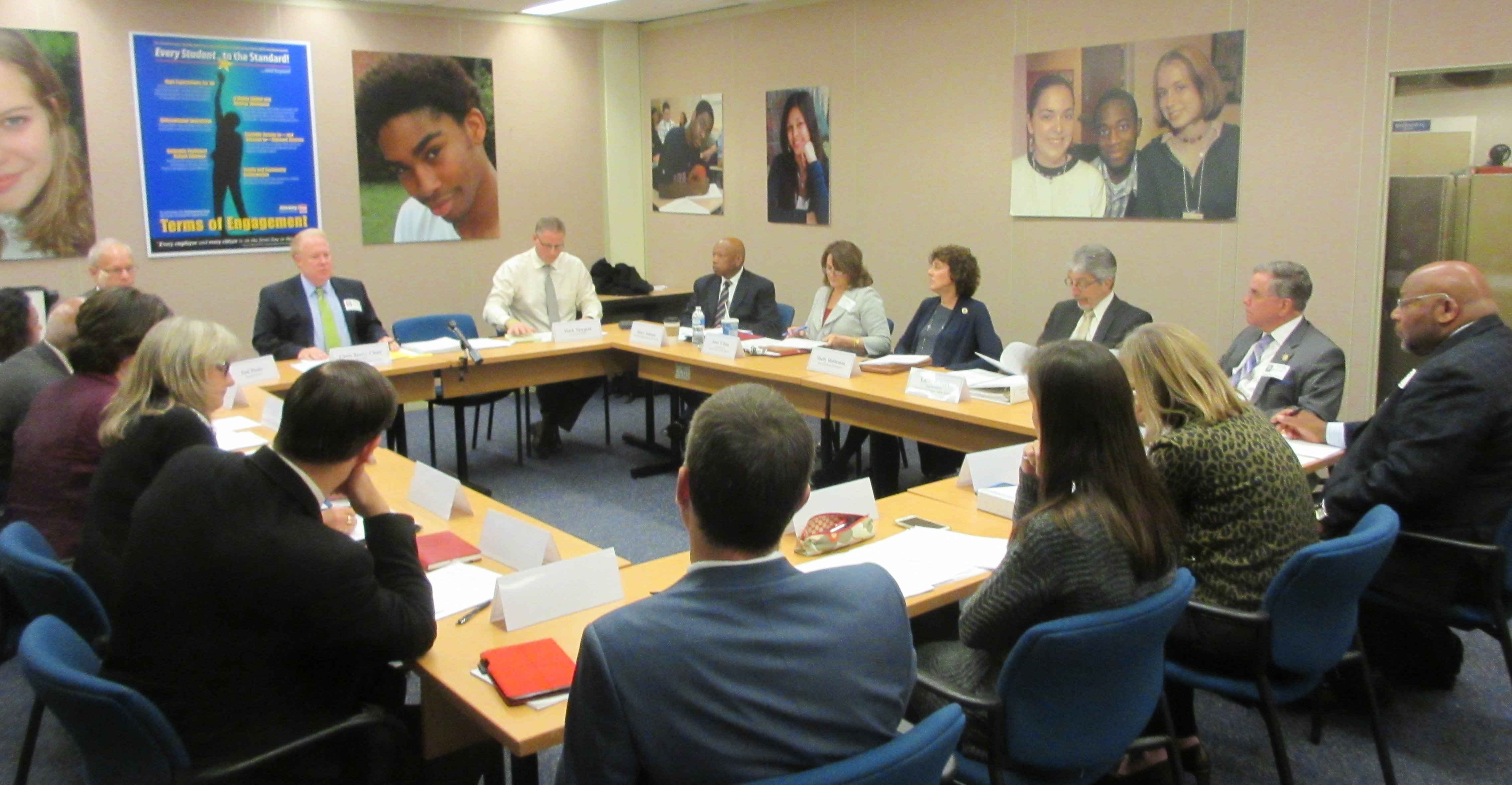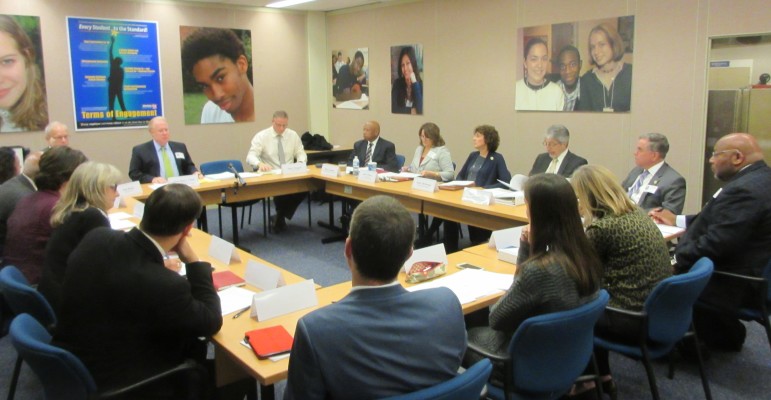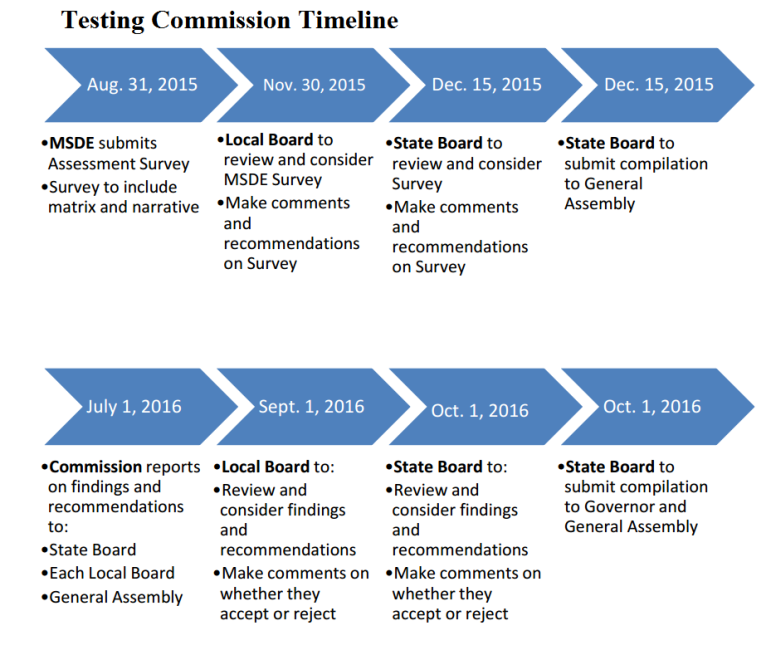By Marissa Horn and Len Lazarick
Capital News Service and MarylandReporter.com
Maryland education officials and lawmakers, members of the state’s first commission to review standardized testing, appeared ambivalent on Tuesday about how they will determine the value of statewide assessments.
Some commission members wanted to look at the technology infrastructure for testing, while others want to further study the ancillary effects on students — such as school computers being used for exams instead of instruction.
With a brief rundown of the state Open Meetings Act, the 19-member commission kicked off its inaugural session a full six months after Gov. Larry Hogan signed the bill creating it. But over the summer, staff at the Maryland State Department of Education had already prepared a 320-page report on mandated tests in each of the state’s 24 school districts, surveying local school boards and principals about their students’ time spent on testing.
Didn’t want to legislate
The lead sponsors of the bill, HB452, Sen. Paul Pinsky, D-Prince George’s, and Del. Eric Ebersole, D-Baltimore-Howard, also serve on the commission and they got a chance to explain their rationale behind the legislation. It passed the House and Senate unanimously reflecting bipartisan sentiment that Maryland students take too many tests.
“We didn’t want to legislate solutions,” said Pinsky, who is vice-chair of the Senate Education, Health and Environmental Affairs Committee. “You need to compare apples to apples,” which is why the law creating the commission required the study by MSDE be done first.
“It’s not your typical bill,” Pinsky said. Rather than sending recommendations directly to the Maryland General Assembly, as most temporary study commissions do, this commission’s recommendations will go first to all the local boards of education and the state board of education by July 1, 2016.
“If they don’t want to adopt the recommendations, they need to show cause” why they won’t, Pinsky said.
Hoping for voluntary compliance
Ebersole, a former math teacher of 35 years, said he hopes the commission’s recommendations will be adopted by the state board and local school boards. If not, Ebersole said, legislation for the 2017 legislative session could be in the works.
“A few people criticized me and said, ‘Why didn’t you pass a law to get rid of testing?’ and the answer was testing is very entrenched, but not entirely unnecessary,” said Ebersole. “From the Maryland Functional Test in the 90s, to the MSAs and HSAs in the 2000s, to the PARCC assessments, they have been taking more and more time out of instruction.”
Lots of tests
The report dedicated 15 pages to naming every assessment that students take in the state, and also composed a breakdown of each school district’s time spent on these individual tests.
The commission plans to meet Dec. 17, when Henry Johnson, interim state deputy state superintendent who is representing Interim Superintendent Jack Smith on the commission, will review the report.
“There is great variability between the school systems and amount of assessments in each,” Johnson said. “Some are in a state of transition right now and there have been some major changes in our districts in terms of assessments since we visited them.”
The length of the detailed reports on each county’s testing schedule gives some idea of the wide variances. The shortest reports on tests given are from Baltimore County (4 pages) and Baltimore City (6 pages) with reports from eight counties at 7 to 9 pages. But some small counties reported even more tests: St. Mary’s, the largest, 30 pages; Wicomico, 23 pages; Somerset 21.
Commission Chair Christopher Berry, principal of James Hubert (Eubie) Blake High School near Olney, said much could change on the federal requirements as Congress reauthorizes the Elementary and Secondary Education Act.
Commission represents wide range of interests
The membership of the commission represents a wide range of stakeholders in Maryland public schools. Besides four legislators appointed by the House speaker and Senate president, there are superintendents, parents, school board members, education experts, and teacher union representatives, all appointed by Gov. Larry Hogan.
Here is a complete list:
- Christopher Scott Berry, Chair, Principal, James Hubert Blake H.S., Silver Spring
- Larry Bowers, Interim Montgomery County Superintendent (large school district)
- Alohaa Chin, Baltimore Teachers Union
- Eric Ebersole, House of Delegates, D-Baltimore-Howard, (appointed by speaker)
- Leon Frison, Harford County Education Association
- Laurie Halverson, Parent, Montgomery County
- Shelly Hettleman, House of Delegates, D-Baltimore County (appointed by speaker)
- Julie Hummer, Anne Arundel County School Board Member
- Henry Johnson, State Superintendent of Schools designee
- Nancy King, Senate of Maryland, D-Montgomery, (appointed by Senate President)
- Nathaniel Malkus, Education Expert
- Mark Newgent, Governor’s policy staff
- Paul Pinsky, Senate of Maryland, D-Prince George’s
- Laura Potter, Maryland State Education Association
- Karen Prengaman, Parent, Worcester County
- Andrew Richard Smarick, Education Expert – Duplicative Testing (also member of State Board of Education)
- Guffrie Smith, Member of the State Board of Education
- Janet Wilson, Garrett County Superintendent (small district)






Do not send your children to government run indoctrination centers. Stop FORCING us to fund this bureaucratic nightmare.
Ambivalent is the right word considering the spectacle in the offing when this rugby-scrum commission’s members debate at the intersection of centrally-planned education and local control. Politics, money, subterfuge and intrigue; a real-life soap opera.
I was educated to learn how to learn. I didn’t need an overarching layer of standardized testing. I didn’t know it at the time, but I could place my trust in teachers to equitably teach and test the material.
When I saw the draft which was of 7159 dollars, I accept that my friend’s brother was like really generating cash in his spare time with his computer. . His aunts neighbor has done this for only 10 months and by now repaid the loan on their home and bought a new Car .This is what they are donig …
>>>>> Visit my ??????? for the site address
264
I’ve read the report and it seems that the county Superintendents aren’t quite being “up front” about what THEY consider High Stakes Testing. Students are not being taught in a classroom, they are NOT LEARNING, they are being fed test prep the whole, entire school year. Students are being tracked and data mined and teachers are being evaluated by tests that have no validity other than to give public schools a bad reputation so that big , for- profit corporations can open charter schools. Everything is so….ORWELLIAN.